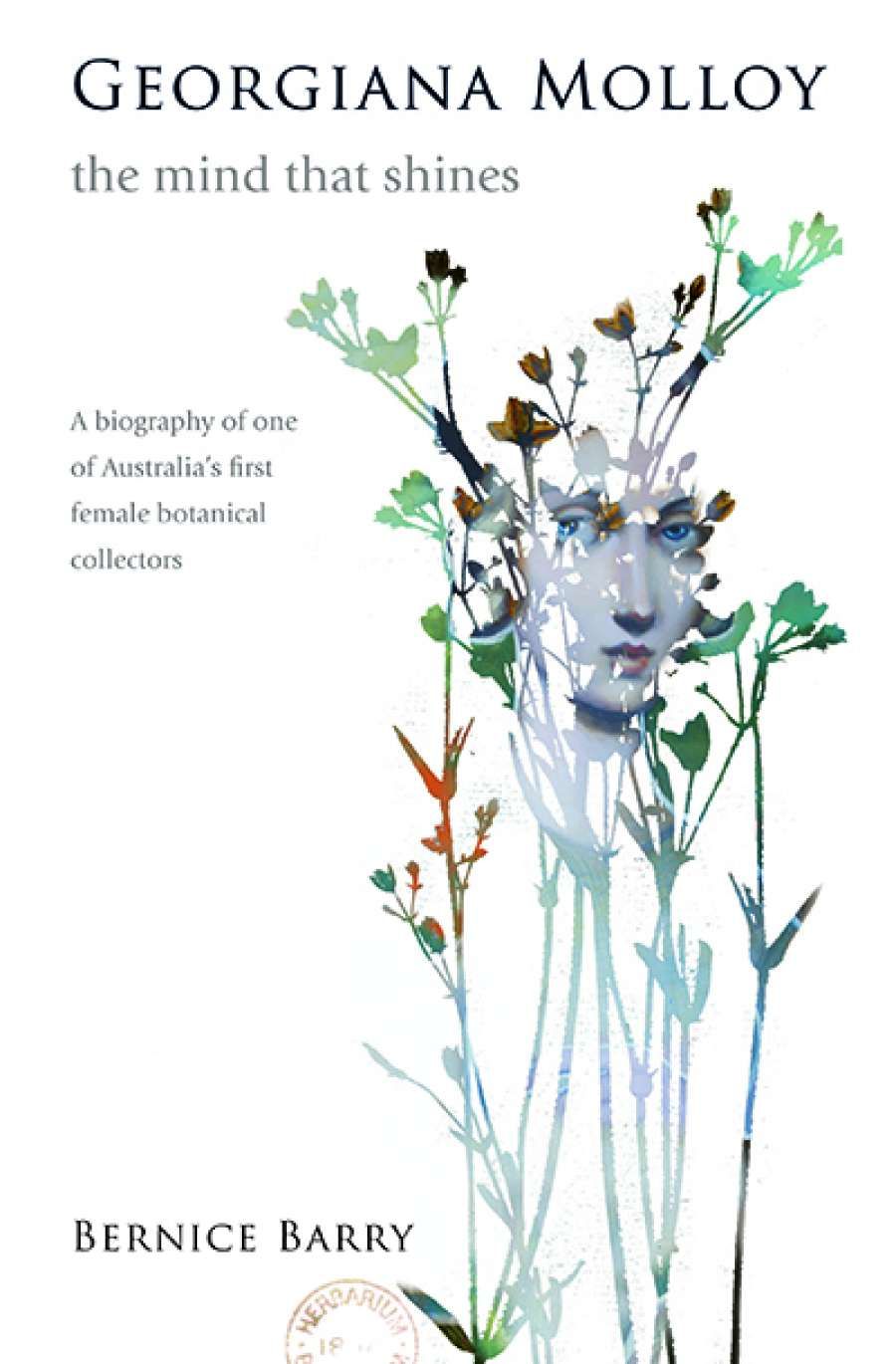
- Free Article: No
- Contents Category: Biography
- Custom Article Title: Danielle Clode reviews 'Georgiana Molloy: The mind that shines' by Bernice Barry
- Custom Highlight Text:
By the end of the eighteenth-century, botany was one of the few sciences regarded as suitable for women. Carolus Linnaeus had infamously ...
- Book 1 Title: Georgiana Molloy
- Book 1 Subtitle: The mind that shines
- Book 1 Biblio: Picador $39.99 pb, 336 pp, 9781743549148
Understanding the history of women in science, therefore, requires the casting of a broader net that encompasses the important peripheral and amateur contributors, whose hard labour often supported the professional scientists who claimed the published credit for new discoveries. Bernice Barry's beautifully crafted book on Georgiana Molloy, one of Western Australia's first European botanical collectors, is an excellent example of that work. Barry not only highlights the significance of Molloy's contribution to Australian natural history, but places her work within the context of a quite remarkable life.
Barry skilfully weaves the individual narratives of Georgiana's early life and family with those of her future husband, John Molloy. In between these threads runs a third strand, that of Barry's own research, which illustrates the joys and limitations of historical research. This structure reminds us gently of the pitfalls of biography: long and tedious; fruitless hours; moments of serendipity; and the impact of a mistranscribed word or apocryphal story. It is refreshing to read history without the omniscient authorial voice. Rather than diminishing the authenticity of the finished product, Barry's acknowledgment of the underlying methodology enhances our confidence and keeps us alert to the gaps and absences in the source material.
There is little in Georgiana's early history that foreshadows the remarkable woman she would become, other than a stubborn determination to stand her ground on difficult family issues. The story of her well-to-do family fallen on hard times reads as if she might have stepped straight from the pages of a Jane Austen novel, complete with a beloved father, unstable sisters, and egocentric mother. Barry carefully corrects earlier biographical images of Georgiana as excessively pious and upright, and provides a far more nuanced and rounded characterisation of a young woman with a strong moral and religious framework, whose lively intelligence, romanticism, and strong will were stifled by a lack of prospects and constrained family circumstances.
Barry pays similarly close attention to reconstructing the history of John Molloy, whose background has historically been shrouded in rumours of illegitimate royal or aristocratic lineage. The real story is more prosaic and tells us far more about the social constraints of the time. Molloy's humble origins were concealed in order to protect his own and his wife's standing in the new colony. These intertwined stories provide a detailed prelude to the pair's eventual emigration to Western Australia and their new life together.
 Specimen from Georgiana Molloy held in Kew Herbarium, UK (via Wikimedia Commons)One of the other strengths of this delightfully written book lies in the author's ability to evoke landscape. Barry's descriptions of Gareloch in Scotland and Augusta in Western Australia provide a real insight into the passion that drove Georgiana. Barry's descriptions of the hardships and complexities of early colonial life are also powerfully revealing: the onerous workload required simply to survive; the displacement and destruction of the Aboriginal community; and the struggle of colonists to adapt or maintain their own shifting culture. Barry makes impressive use not only of a wealth of archival research, but also of location research, a technique more commonly employed by creative writers to generate atmosphere and sense of place, than in more traditional histories and biographies.
Specimen from Georgiana Molloy held in Kew Herbarium, UK (via Wikimedia Commons)One of the other strengths of this delightfully written book lies in the author's ability to evoke landscape. Barry's descriptions of Gareloch in Scotland and Augusta in Western Australia provide a real insight into the passion that drove Georgiana. Barry's descriptions of the hardships and complexities of early colonial life are also powerfully revealing: the onerous workload required simply to survive; the displacement and destruction of the Aboriginal community; and the struggle of colonists to adapt or maintain their own shifting culture. Barry makes impressive use not only of a wealth of archival research, but also of location research, a technique more commonly employed by creative writers to generate atmosphere and sense of place, than in more traditional histories and biographies.
That Georgiana was in possession of, as the title says, a 'mind that shines' is indisputable. Her fastidious botanical collecting in meticulous duplicate was done on top of an astounding workload of sowing, harvesting, butchering, cooking, cleaning, sewing, childcare, and household management unimaginable to those either of her own class, or our own times. While we might have expected a well-bred young lady like Georgiana to be well-versed in gardening, her ability to recognise darnel weed seeds infiltrating the wheat, or to adapt an old country remedy for the treatment of fungal spores, suggests more than a conventional level of competence.
Perhaps the most poignant element of this story though, is the periodic punctuation of the news that Georgiana was 'expecting another baby'. A baby every two years would be challenging enough for anyone contending with the hard labour of early colonial life and the grief of infant death, all this without family support. In the absence of adequate medical care, each birth cast a fearful and ever-increasing shadow over Georgiana's young life. She seemed in no doubt about the inevitability of her fate. We are left to imagine how much more brightly Georgiana's mind might have shone had she been able to escape the onerous and ultimately deadly responsibilities of her 'fairer sex', and lived to enjoy the safety and comforts of old age.


Comments powered by CComment